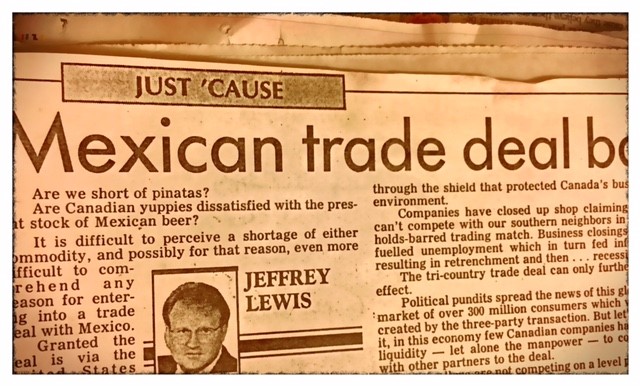At Donald Trump’s insistence that the US is being treated unfairly under the North American Free Trade Arrangement, negotiations will reopen today on the terms and conditions settled more than 20 years ago.
When the concept of the North American Free Trade was introduced in 1990, it raised questions, concerns, and anger, in Canada. This country was still trying to deal with the trade agreement reached with the United States in 1987.
I, then, was vocal about the proposed deal. To add Mexico to what seemed to be an already imbalanced arrangement did not make economic sense. This column was the first of many I wrote in my newspaper days.
Since then, both Canada and the U.S. have felt the effects of the deal. Mexico’s cheap labour was a draw for many manufacturing plants. The auto industry alone, especially in the US, took a major hit.
Indeed, there have been changes over the past few decades, and there are issues within the agreement that could be updated, and segments of the economy that could benefit from new language.
Trump says NAFTA will be renegotiated or “torn up” because it is not fair to the United States (which currently enjoys a $16 billion trade surplus with Canada). He says he has studied the document, and he will get the best deal possible for America.
I, as one opposed to the initial deal, have no problem seeing the terms renegotiated.
The problem I have is dealing with the current US administration. Trump’s interpretation of what is, and what is not, fair needs to be questioned, especially after hearing his statements about the civil unrest last weekend, and his definition of right and wrong.
From 1990. . .
Are we short of piñatas?
Are Canadian yuppies dissatisfied with the present stock of Mexican beer?
It is difficult to perceive a shortage of either commodity, and possibly for that reason, even more difficult to comprehend any reason to enter into a trade deal with Mexico.
Granted the deal is via the United States and, in the shadow of Operation Desert Storm, the Canadian government has overwhelmingly expressed the willingness to latch onto the britches of the Bush administration.
Yet why are we so willing to participate in this trilateral deal?
The benefits of the late ’80s U.S. – Canada Free Trade Agreement are still not clear.
We are in the midst of what has been called the first made-in-Canada recession. Our economic policy partially dictated this slump. But it is interesting to note the recession comes not long after the ink dried on the U.S. deal. The free trade agreement shot holes through the shield that protected Canada’s business environment,
Companies have closed up shop claiming they cant compete with our southern neighbors in a no-holds-barred trading match. Business closings have fueled unemployment which in turn fed inflation resulting in retrenchment, and then. . . recession.
The tri-country trade deal can only further this effect.
Political pundits spread the news of this glorious market of over 300 million consumers which will be created by the three-party transaction. But let’s face it, in this economy few Canadian companies have the liquidity — let alone the manpower — to compete with other partners to the deal.
After all, we are not competing on a level playing field.
As much as we have cared to, the trade deal with the U.S. has been accepted. We are already partners to a contract with a country that pays less regard to its quality of life than we do.
So why add another country with even less regard for its land and its people?
Historically, Canadian government’s have gone to great lengths to protect the social and economic fabric of the nation. Our elected officials provided virtually unlimited access to healthcare and through legislation protected the countriy’s business from the competition of the global market. We had tariffs and duties and a host of programs that offered buoyancy to the economy. We continued to supplement the agricultural sector so our products and the producers could survive.
These programs were supported by our tax dollars and although heavily taxed, our demands for higher wages were met. Canada enjoys a high-wage scale that is necessary to support our tax base.
The root of the fierce argument against the trade deal is wages. Canada is fortunate to be a top-wage nation. The U.S. could be considered the middle-ground, but as we go south the wage scale drops right off.
Canadian manufacturers fear heavy competition from companies producing goods in Mexico, and that fear is founded. Labour costs — indeed a big cost of doing business — are more than dramatically reduced for competitors in the south.
It is accepted the expanded market created by the merge would feature over 300 million consumers. But based on his or her average wage, is the average consumer from poverty-stricken Mexico even able to afford the goods produced by trading partners to the far north?

Leave a Reply